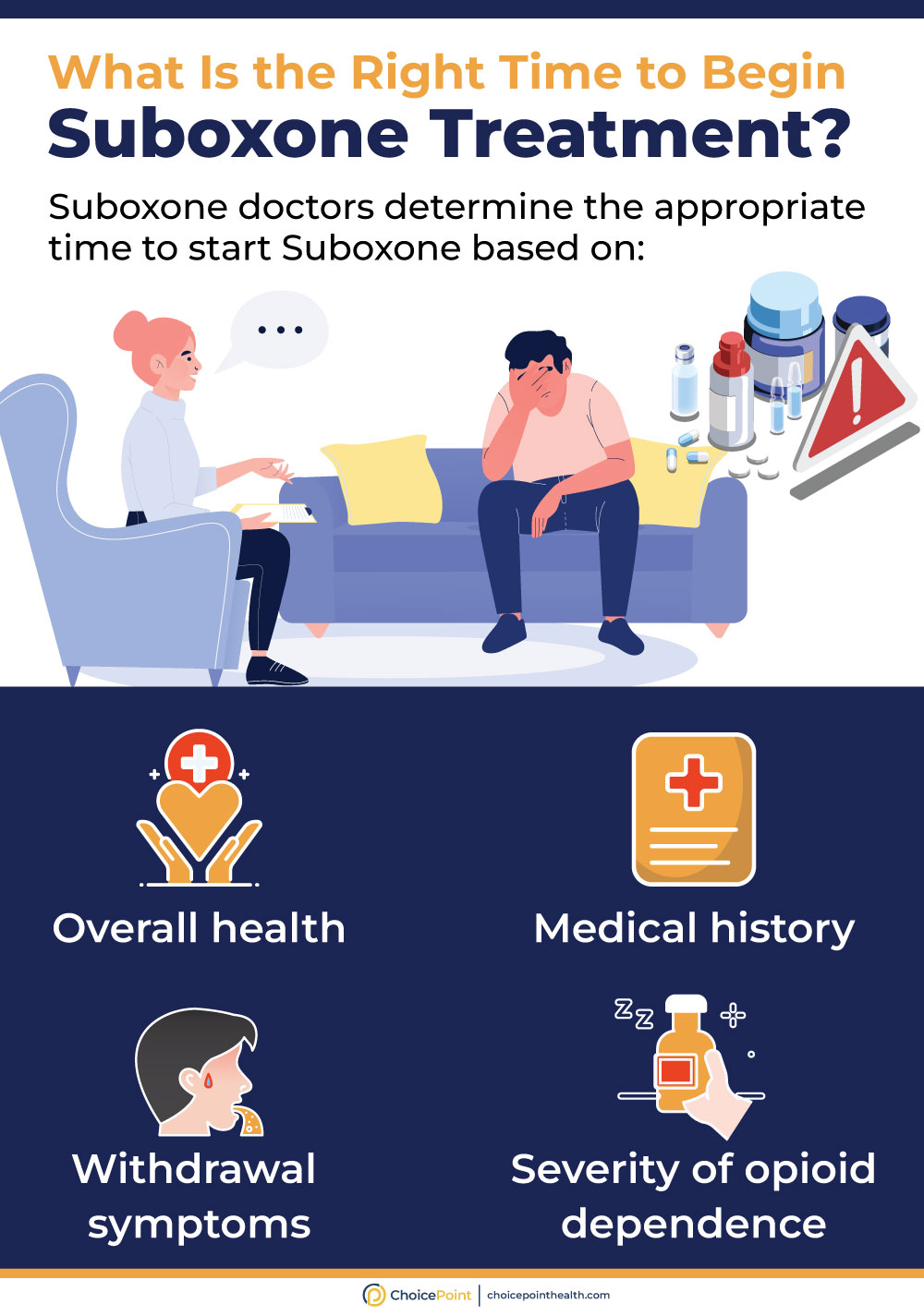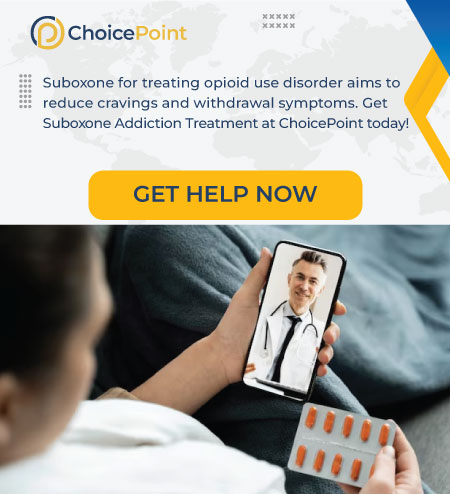Suboxone, a combination of Buprenorphine and Naloxone, has proven to be an effective tool in the fight against opioid addiction. While Suboxone may help people break free from Opioid Use Disorder, many people may wonder, ‘How Long after Suboxone Can I Get High?’ Let’s discuss how Suboxone is administered, the importance of medically supervised treatment, and what to expect during the medication-assisted program (MAT).
You and your loved ones deserve to overcome addiction. Start your recovery journey with ChoicePoint’s MAT Program today.
Table of Contents
How Long after Suboxone Can I Get High- 3 Things You Should Know
If you have been wondering about How Long after Suboxone Can I Get High, then your question is about to be answered in detail. However, note first that attempting to get high shortly after taking Suboxone is strongly discouraged! It is due to the presence of Buprenorphine in Suboxone. It may block the effects of other opioids and may pose serious health risks. Here are some things you should know:
- Misuse of Suboxone may lead to severe withdrawal symptoms. It is essential to follow prescribed guidelines for the safe and effective use of Suboxone.
- It is highly recommended to consult with a doctor before taking or discontinuing Suboxone.
- Misusing opioids or any other drugs shortly after taking Suboxone is not only unsafe but highly counterproductive to the treatment of opioid addiction.
People who have a substance use disorder and are taking Suboxone should not jeopardize their treatment by thinking about How Long after Suboxone Can I Get High! Suboxone’s primary role is to support recovery. Therefore, individuals on this journey must prioritize open communication with healthcare providers and adhere to prescribed guidelines.

Recovery is something you must work on daily,” said Elizabeth Taylor.

Recovery is something you must work on daily,” said Elizabeth Taylor.
How Long Does Suboxone Block Opiate?
Suboxone is introduced into the body to block Opiates. To gain a better understanding of How Long after Suboxone Can I Get High, let’s understand Suboxone’s function:
- Suboxone, when used during addiction treatment, may be taken once a day or as prescribed by the doctor.
- It automatically binds itself to Opiate receptors and prevents the Opioids from attaching or causing euphoric effects.
- Buprenorphine is rapidly absorbed after an oral intake. It reaches its peak effect within 40 to 120 minutes.
- The blocking effects of Suboxone may last for 24 hours. In some cases, it may extend up to 60 hours.
- The blocking effects are highly influenced by individual factors such as weight, metabolism, and drug abuse history.
How Is Suboxone Administered?
As of 2023, a medical provider with a DEA license and Schedule III authority may write and prescribe Suboxone. Make sure to follow the medical provider’s specific instructions during each dose. It is typically available as a tablet or a dissolvable sublingual film. To ensure proper absorption into the body, Suboxone film must be placed under the tongue. Remember the following when taking Suboxone:
- Please do not chew or swallow. This may prevent the medicine from working properly.
- Don’t speak while the medicine is in your mouth. This could also influence how the drug is absorbed.
The healthcare provider may adjust the dosage as required and keep patients under constant care. Note that addiction medication, including Suboxone, may work best when combined with other treatment methods like psychotherapies.

When Can I Take Suboxone®?
Suboxone Administration 101- Suboxone Dosage Tips for Effective Treatment
It is available in various strengths, each with a unique buprenorphine-naloxone ratio. When administered sublingually, the medication becomes effective 30 to 60 minutes after ingestion. It is advised to consult a healthcare provider for an individual dosage recommendation. Most addiction treatment plans begin with an induction phase, in which Suboxone is administered at a lower dosage. This helps the body to build tolerance before reaching a therapeutic dose. The dosage can then be gradually increased until an effective level is achieved. Here are five most effective tips for Suboxone administration:
- Personalized Assessment
- Medical Supervision
- Consistent Adherence
- Monitoring Duration of Effects
- Adjustments for Tolerance
Importance of Medical Supervision
Opting for medically supervised Suboxone treatment is crucial for safe and effective recovery because:
- Medical professionals can tailor the dosage
- Monitor side effects
- Provide necessary adjustments to ensure optimal treatment outcomes
Looking for encouragement during addiction recovery? Gillian McKeith’s Shared Top Nutrition Tips to Boost Your Addiction Recovery Journey.
Receiving Medication-Assisted Treatment with Suboxone at an Addiction Rehab
Medication-assisted treatment (MAT) using Suboxone is a critical component in addiction treatment, especially for individuals struggling with Opioid Use Disorder (OUD).

MAT can be explained simply as FDA-approved Medications + Psychotherapies = Addressing complexities of addiction

MAT can be explained simply as FDA-approved Medications + Psychotherapies = Addressing complexities of addiction
What to Expect During MAT?
The journey towards addiction recovery usually begins with a thorough assessment by healthcare professionals. Here is what patients may expect next:
- Assessing the patient’s medical history, the severity of addiction, and any co-occurring mental health issues.
- If Suboxone is deemed appropriate, a healthcare provider will prescribe it.
- This procedure is carried out under close medical supervision to ensure accurate dosing and alleviate any immediate withdrawal symptoms.
- A healthcare provider may then assess the patient’s response to the medication and make any necessary dosage adjustments.
- Regular medical check-ups and counseling sessions may assist in recovery.
- MAT with Suboxone is accompanied by comprehensive therapeutic support.
- Individual and group counseling addresses the psychological aspects of addiction by providing coping strategies and tools for long-term recovery.
- To ensure long-term recovery, Suboxone may be gradually tapered off, along with ongoing counseling and participation in support groups.

Did you know : that before beginning treatment, patients attend a MAT Overview Appointment? Where they undergo a physical examination and lab tests. A MAT healthcare team will review induction instructions and create a follow-up plan for Stabilization and Maintenance.

Did you know : that before beginning treatment, patients attend a MAT Overview Appointment? Where they undergo a physical examination and lab tests. A MAT healthcare team will review induction instructions and create a follow-up plan for Stabilization and Maintenance.
How Does ChoicePoint’s Team Help Patients Start Suboxone?
Did you know that not all doctors are allowed to prescribe addiction medication, including Suboxone? However, ChoicePoint has DEA-certified practitioners who are authorized to prescribe it. Our addiction treatment journey goes like this:
- Free Assessment
- Insurance Verification
- E-registration
- Plan Review
- Clinical Treatment
Our doctors combine FDA-approved medications with Pyschotherapies to assist patients in achieving long-term sobriety. Our levels of care include:
- Medical Detoxification
- Inpatient Rehabilitation
- Partial Hospitalization Program (PHP) / HIOP in NJ
- Intensive Outpatient Program (IOP)
- Outpatient Treatment
- Aftercare and Continuing Support
- Medication Assisted Program (MAT)
Break the cycle of addiction and create a positive ripple effect in your family and community. To begin addiction treatment at ChoicePoint, call us at 844.445.2563 now! We accept most Insurance plans; make sure to verify!
Key Inquiries About Suboxone
To better understand How Long after Suboxone Can I Get High, read commonly asked questions;
Can You Get High on Suboxone If You Take It Daily?
Suboxone’s effects vary according to individual factors. If you’re new to opioids, you may feel it right away, but tolerance develops with time. It is a partial agonist, which limits the scope of its effects. Opiates should not be used while taking Suboxone because the blocking properties of buprenorphine or naloxone may cause illness. It is advised to take Suboxone carefully, under doctor’s orders only.
What Is Suboxone Used for, and How Does it Work?
It is used to treat opioid dependence by reducing withdrawal symptoms and cravings. It contains buprenorphine and naloxone; buprenorphine reduces cravings, while naloxone deters misuse.
What Is the Recommended Suboxone Dosage, and What Are Its Common Side Effects?
The dosage of Suboxone may vary from person to person, but it’s typically once a day. Healthcare providers determine individualized dosing. Side effects of Suboxone may include
- nausea
- headache
- insomnia
Consult your healthcare provider for personalized guidance.
How Is Suboxone Different from Methadone?
It is a partial opioid agonist, while methadone is a full opioid agonist. Both are used in opioid addiction treatment with variations in mechanism and administration. At ChoicePoint, our doctors offer Suboxone as part of their MAT program.
What Is the 3-Day Rule for Suboxone?
The three-day rule allows practitioners to administer no more than one day’s worth of medication for three days, which cannot be renewed or extended. During the three days, the provider is responsible for referring the patient to a maintenance or detoxification program.
Does Suboxone Interact with Other Drugs?
Yes! It is extremely dangerous to take benzodiazepines such as Xanax or Valium while on suboxone treatment. Both benzodiazepines and suboxone depress the central nervous system. When taken together, they may cause:
- impairment
- unconsciousness
- respiratory failure
- coma
- even death
Medical Disclaimer:
ChoicePoint aims to improve the quality of life for people struggling with substance use disorder and mental health issues. Our team of licensed medical professionals research, edit and review the content before publishing. However, this information is not intended to be a substitute for professional medical advice, diagnosis, or treatment. For medical advice please consult your physicians or ChoicePoint's qualified staff.











Review How Long after Suboxone Can I Get High?.